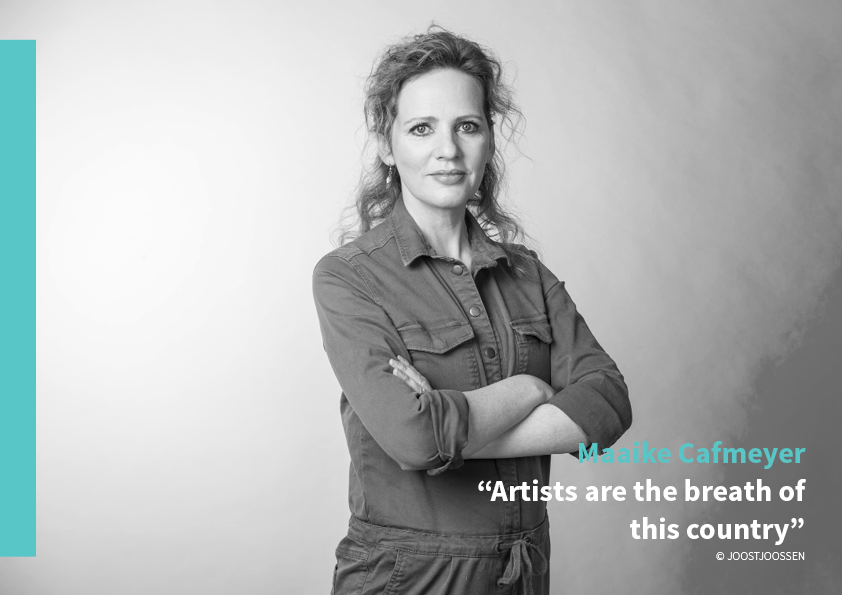Maaike Cafmeyer: “Artists are the breath of this country”
December 13 2021
It’s impossible to imagine her offscreen in Flanders. She made her big breakthrough on TV via her personages in Het geslacht De Pauw and Aspe. Meanwhile, Maaike Cafmeyer has become a real TV icon. But she is so much more than an actress. A candid interview with Maaike, who has been a loyal member of PlayRight since we can remember!
Where do we mainly know you from? What are/were your biggest roles?
Maaike: I don’t know if people know me from one role in particular. Sometimes I hear people whisper: “Isn’t that “the one” from Eigen Kweek, but was her hair not different?” Or: “Wow, she has seriously gained weight since Daarmee Basta”. Of course, I also play theatre, so people can see me acting there, as well, luckily. Although that makes for special intermezzos. After Chekhov’s Uncle Vanya – a quite dramatic piece – a decent gentleman once came to ask for an autograph. He addressed me like this: “Sorry to say so, but I think you are way funnier on TV.” Well, I’m just saying, people see what they want to see, right?
Acting is your main profession. Do you also do other things?
Maaike: I’ve just had a tough shooting period during which there was little room for other things. We were ‘hidden’ in a hotel in the Westhoek (West-Flanders) for three months. I was happy to see my kids on the weekend. Furthermore, acting absorbs you entirely. Getting up very early in the morning, long shooting days and studying your lines for the next day in the evening. I wish I had the time to start knitting again, or to read a book. But most of the time, I just fell asleep straight away.
For how many years have you been active as an actress? When did it all start?
Maaike: It started as early as in kindergarten, I must admit, when the amateur theatre club ‘De Rembert’ from Torhout came to rehearse in our large garden. It triggered me to see all those people being dressed up, wearing a lot of makeup and having so much fun with each other. Later, after some student-like wanderings, I ended up at the Conservatory. I used to be shy but acting has really given me a voice.
I was 26 years old when I was offered my first full role by Sam Bogaerts in Wachtend op Godot (Waiting for Godot) (2000). Since no women were allowed to act in this Becket – as his heirs had imposed strict restrictions – I was presented as Mike Cafmeyer. Hence, I made my first debut as a man. Not that it mattered much. Eventually, we were forced to stop playing due to a penalty imposed by the judge for each performance played.
How has the acting world changed in recent years? Have you noticed huge differences since the rise of digital exploitation and online streaming platforms?
Maaike: To be honest, it does not affect me that much. Sometimes people in Holland recognise me, yes, but when I was in Paris last week, it was not as if they offered me a gin and tonic because of my acting. My bank account also keeps fluctuating around that red line. So I will continue building the road here in Flanders. Investing with my company in theatre and writing.
Does online streaming of the series or movies in which you play increase your fame? Does it help you reach a wider audience?
Maaike: More people are watching, without a doubt. I once received fan mail from the Philippines in which someone asked me which drama school I had attended… that is something I had never thought possible.
And of course, social media gives streaming a boost. If Ricky Gervais spreads the message that De Twaalf is an amazing series, that seriously has a huge influence.
However, I don’t see myself getting any more work out of it at the moment. It’s not as if wonderful offers from London are suddenly coming my way. Unfortunately. I would have to put a lot of work in it to make that happen. For instance, I would have to hire an international agent. And we can’t forget that the economic reality is that I am a 48-year-old woman. That’s not exactly a gap in the market, if you know what I mean.
On the other hand, it is nice that people from Spain and the Czech Republic can see our series and films. The world is getting smaller in that regard, which is only positive.
What are your biggest frustrations with online streaming and the remuneration that you currently get as an artist?
Maaike: Well,that great meta range has a huge downside for us, actors, of course. We don’t receive a penny. It is a business model that raises eyebrows. How is that even possible? When a film or series is successful, it is absolutely normal that the creative links involved should be remunerated for the credits.
We also take it for granted that a baker earns money by selling bread, right? We don’t just pay for the bread. No, as customers, we invest in his shop. We pay his staff, his bread bags, his chocolate experiments, his quest to make better cakes and so on. In other words, we don’t just pay for the product. Take the baker out of the bakery and there’s nothing left.
Many people don’t understand the need for fair pay for us, artists, because it seems so abstract. It sometimes appears as if we should be happy to just have a job. That frustrates me.
I thought that the “Juist is juist” (“Fair is fair”) campaign would finally put the spotlight on the value of correct and fair working conditions for all parties involved. But that was too optimistic.
I sometimes get a little tired of the kind of Sisyphus work that we, actors, must carry out just to be paid fairly. Nothing more and nothing less. People often think that you’re rich because you’re on television a lot. The reality is quite disappointing, though. That’s a wrong perception. It’s not about becoming rich.
Furthermore, we’re not really in a good negotiating position. As actors, we depend on producers. They are our employers. Obviously, the actor’s financial negotiating position is not in proportion to that of a financially strong production company. Producers want to get the most out of it. But we, too. However, it’s still a bit like “David and Goliath go shopping together”. Fortunately, there is the existence of de “Acteursgilde”.
Are you familiar with our recent campaign in which artists were mobilizing to defend their neighbouring rights?
Maaike: Yes, I am, and I support it a 100%.
How would you like to help boost the campaign?
Maaike: Whenever I can give a speech somewhere, I do so. I was already a member of PlayRight when it was still called Uradex. When it changed into PlayRight, I once again took a cab through Brussels to personally hand in my ten kilos of papers so that I would certainly not miss out on my rights.
What do you think needs to change urgently in Belgium in terms of rights and remuneration for actors?
Maaike: A more deliberate cultural policy, without a doubt. Belgium should understand that we are the heart of this country. People are always so proud of our artists, when it comes to boast about the final product. But real government involvement in our field would manifest itself in, for example, underlining the need for proper remuneration for the artist. Instead of considering it a “faits divers”.
Complying with the European Directive which states that a performing artist is entitled to appropriate and proportionate compensation would not be out of place. If we want to compete at European level, this directive will be essential. As my grandfather, who was a baker, would have said: “There’s nothing wrong with being proud about making the best cream, but you have to be able to make it in the first place.”
What projects are on your agenda this year and next year?
Maaike: If COVID doesn’t throw a spanner in the works, Peter De Graaf and I will start playing our show Hullep in January 2022. We will be touring for two months. Besides that, Chantal will be on air this spring and we will play a sequel to Mijn slechtste beste vriendin.
How do you see the future?
Maaike: I hope I can keep doing my job until I’m very, very old. I would also like to dedicate myself to continuing to improve the position of women in our business. I’m really looking forward to an influx of female writers, editors and directors.
And of course, visit al the European capitals with my family. Just because I love it.



